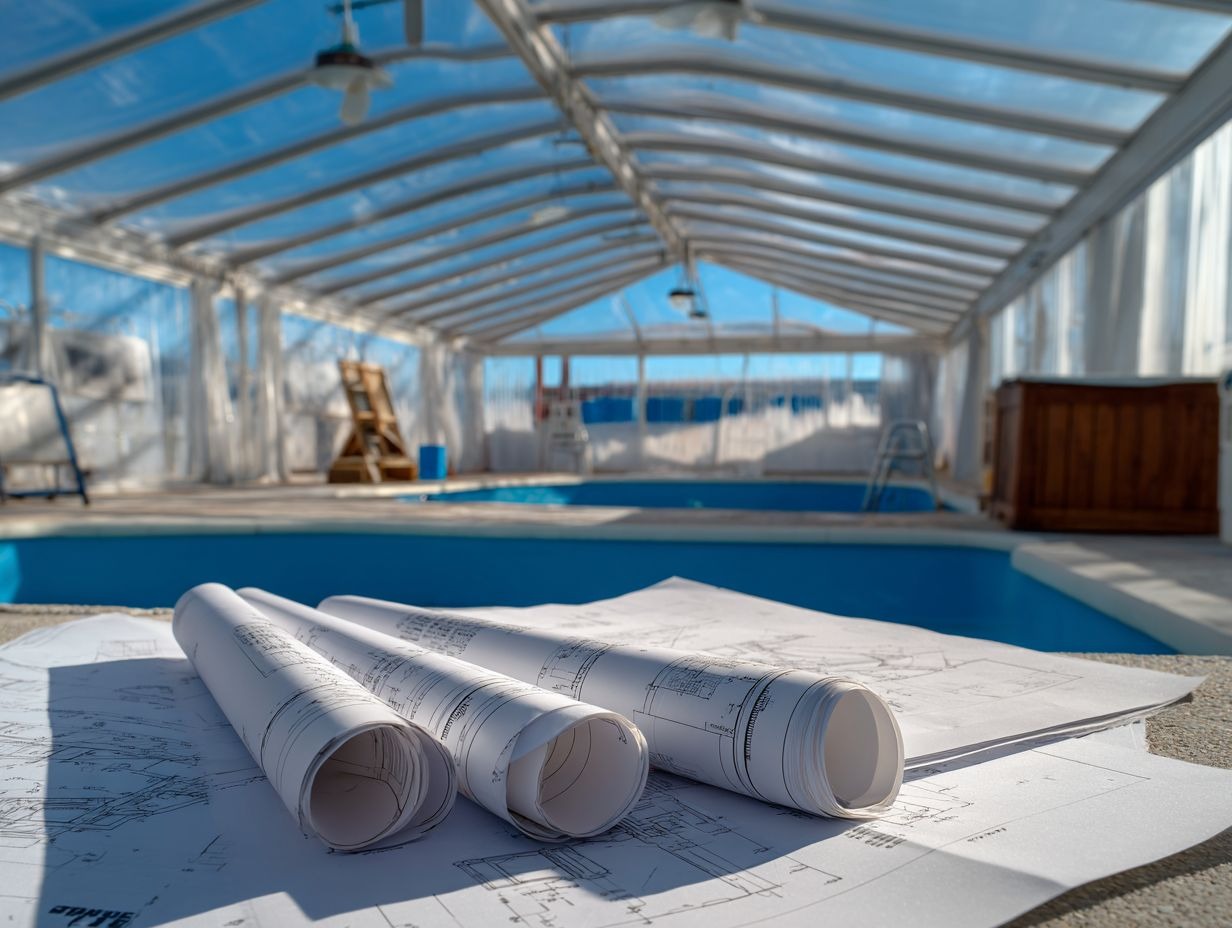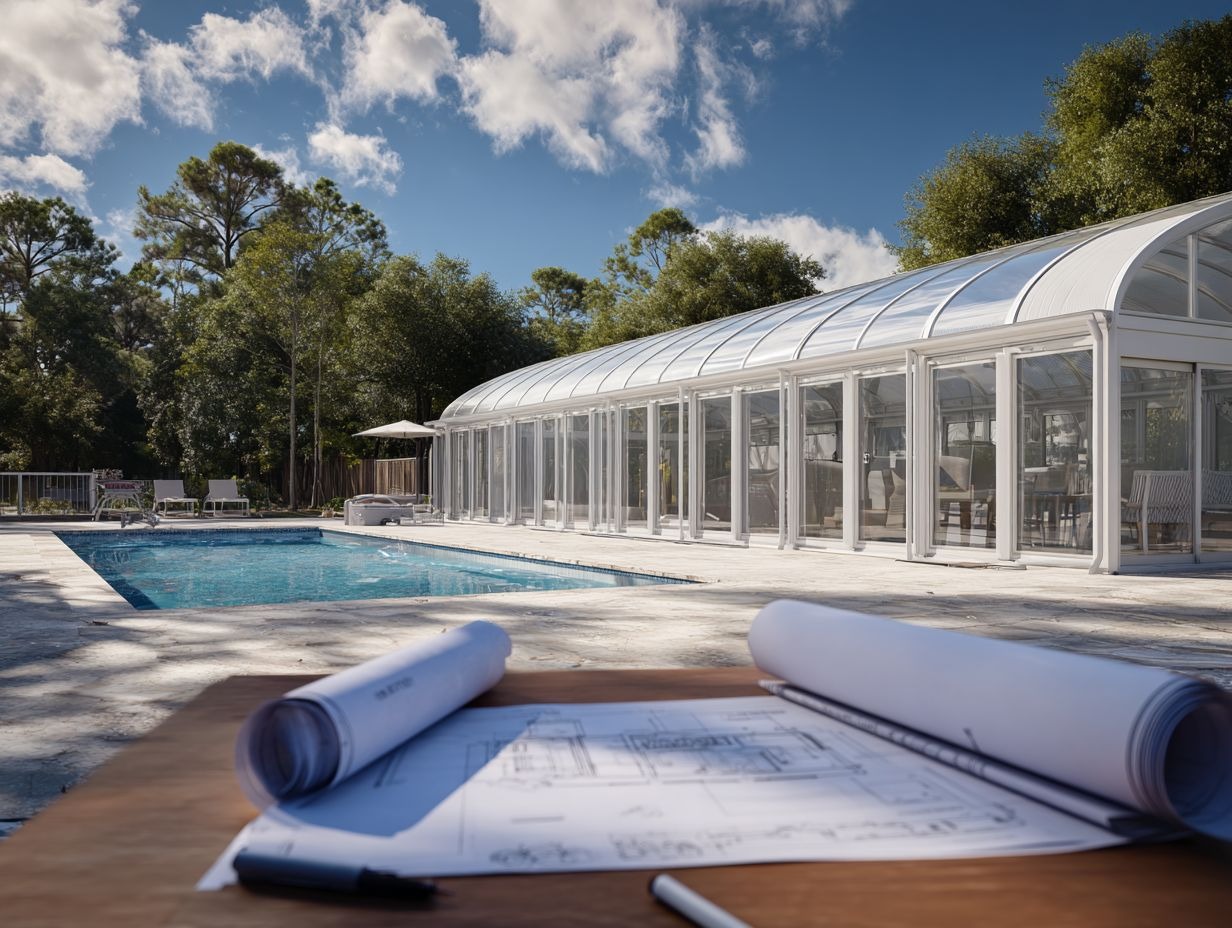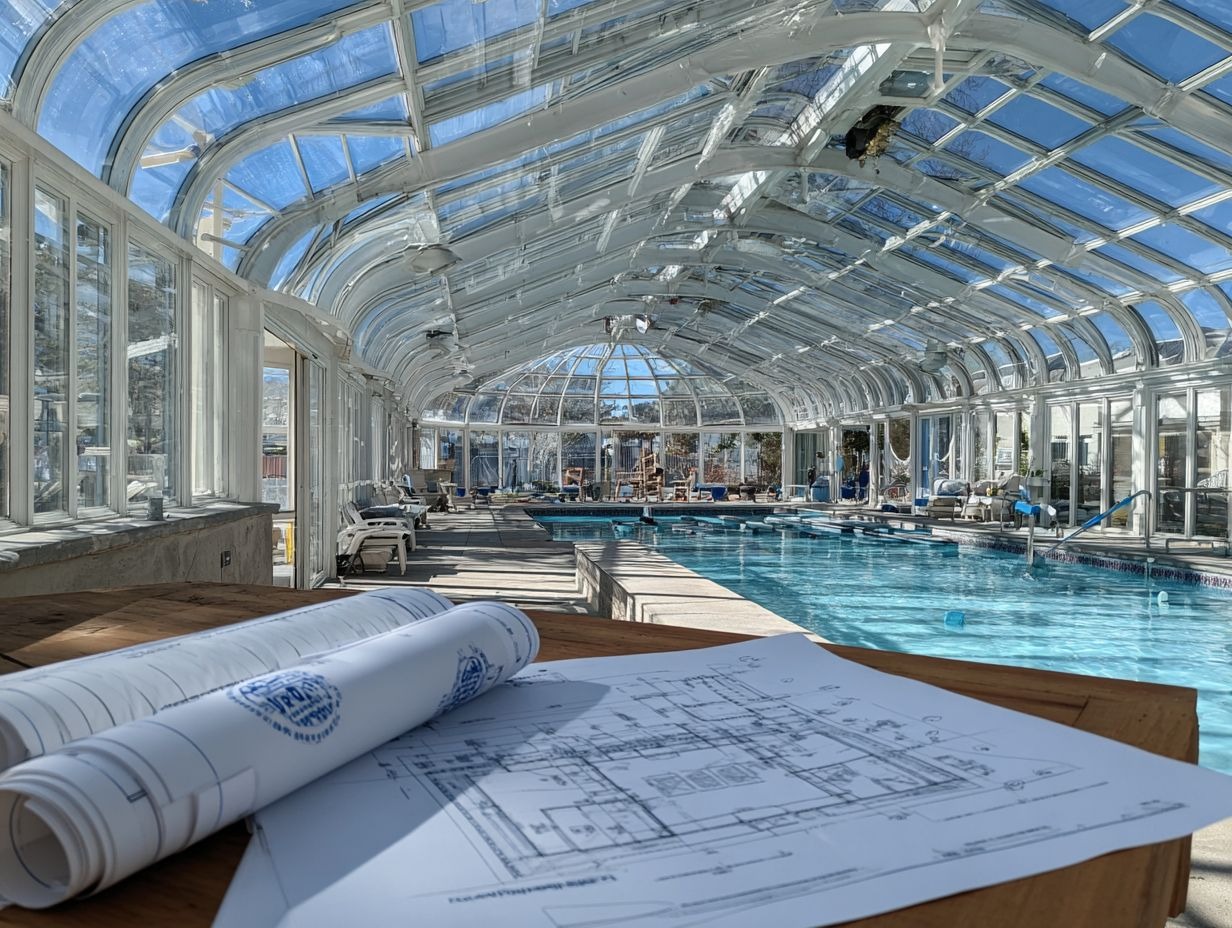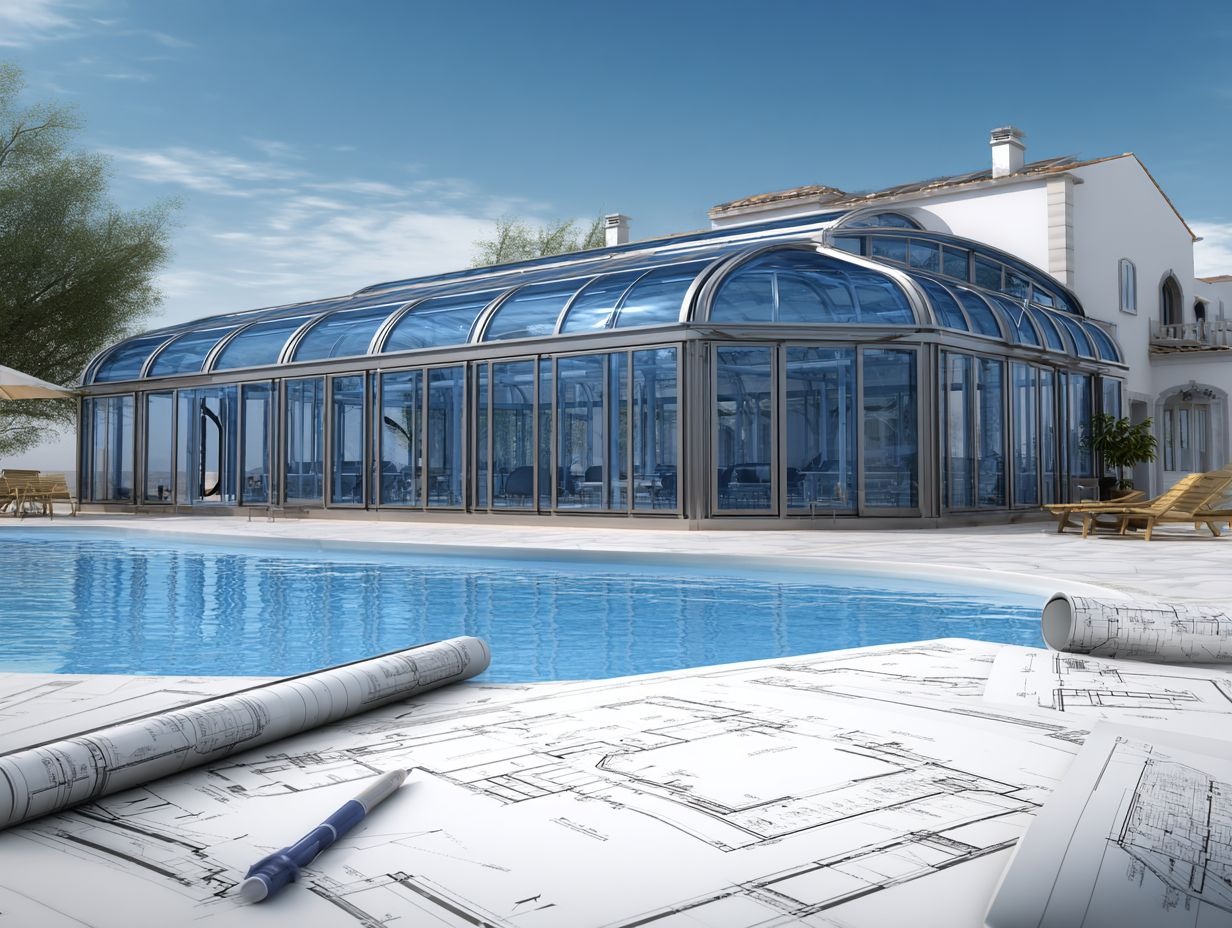Miami-Dade Wind Load & Permit Rules for Pool Enclosures


Residents of Miami-Dade County must prioritize the protection of their pool enclosures against severe hurricanes, which can generate wind loads reaching up to 170 miles per hour. This guide provides a comprehensive overview of the rigorous Miami-Dade wind load requirements, encompassing essential ratings for screen enclosures, the permitting process, approved materials, and common challenges to avoid. Explore how industry experts, such as AB Aluminum, manage engineering, approvals, and installations to deliver secure, insurance-compliant solutions—along with frequently asked questions on retrofitting. Maintain compliance and safety.
In Miami-Dade County, wind load requirements for pool enclosures are rigorously enforced owing to the area's susceptibility to hurricanes. These standards mandate that all pool screen enclosures be designed to endure extreme wind forces, thereby guaranteeing both safety and structural integrity. Local building codes stipulate that such enclosures must be engineered to withstand high-velocity winds, often exceeding 150 miles per hour in high-velocity hurricane zones, to avert structural collapse during severe weather events.
As an authoritative resource on these matters, it is imperative for homeowners and contractors to comprehend the Miami-Dade pool enclosure permit and the prevailing pool cage wind load Miami standards. This knowledge is essential for achieving installations that fully comply with regulations. AB Aluminum, recognized as industry experts, guarantees adherence to these requirements through meticulous engineering and thorough compliance assessments, thereby protecting properties from Florida's intense weather conditions while streamlining the permitting process.
High wind loads are required in Miami-Dade County due to the region's location within a high-velocity hurricane zone, where tropical storms and hurricanes frequently present substantial risks to structures.
This susceptibility arises from Florida's geographical placement as a peninsula bordered by warm Atlantic waters, which facilitate hurricane development. According to historical records from the National Oceanic and Atmospheric Administration (NOAA), more than 120 hurricanes have impacted the area since 1851, including the catastrophic Hurricane Andrew in 1992, which inflicted $27 billion in damages and catalyzed comprehensive regulatory reforms.
Building code standards evolved significantly following Hurricane Andrew, culminating in the rigorous Florida Building Code. Miami-Dade County exceeds these requirements through its High-Velocity Hurricane Zone (HVHZ) provisions, which mandate that structures, including pool enclosures, endure wind speeds of up to 175 miles per hour.
Local ordinances require Miami pool screen regulations for compliance; these are typically constructed as mesh enclosures designed to resist uplift forces and debris impacts. Compliance is enforced via thorough inspections conducted by the county's Building Department.
By advocating for these robust design standards, regulatory authorities promote community safety and mitigate future vulnerabilities, particularly as sea levels rise and storm intensities escalate, in accordance with reports from the Intergovernmental Panel on Climate Change (IPCC).
Pool screen enclosures in Miami-Dade County are generally required to withstand wind speeds ranging from 130 to 170 miles per hour, depending on the specific location within the county's high-velocity hurricane zones.
These wind resistance ratings are categorized into tiers based on the site's exposure and risk classification, as specified in the Florida Building Code. For example, coastal regions typically necessitate ratings at the higher end of 150 to 170 miles per hour to endure Category 4 or 5 hurricanes, whereas inland areas may require only 130 to 140 miles per hour to address lower wind threats.
Structural testing for these enclosures complies with stringent ASTM E330 standards, which simulate extreme pressure conditions to verify integrity and prevent deformation.
Variations in requirements stem from factors such as local topography and elevation; for instance, a residence adjacent to Biscayne Bay demands more robust anchoring than one in a suburban area like Coral Gables.
hurricane-resistant screen enclosure designs feature extruded aluminum frames, UV-stabilized mesh screening, and corrosion-resistant fasteners, all engineered for enduring durability in the face of salt-laden air and high-velocity debris impacts.
A 2022 study conducted by the Insurance Institute for Business & Home Safety (IBHS) indicates that properly installed enclosures of this type can mitigate wind-borne damage by as much as 70 percent.
Key Features:
Miami-Dade County's wind load regulations have a significant impact on both the installation of new pool enclosures and the replacement of existing ones. All such projects must undergo comprehensive engineering evaluations to ensure they can withstand the region's severe hurricane conditions.
For new installations, this entails the integration of cutting-edge materials and designs from the initial planning stages. In the case of replacements, complete retrofitting is frequently required to align with current standards, thereby preventing expensive compliance violations.
Homeowners are advised to approach these regulations with diligence, as failure to comply may result in denied permits or compromised safety.
AB Aluminum excels in providing engineered pool cage Miami solutions, incorporating code compliant pool enclosure principles. The company offers comprehensive assistance throughout the process, from design conceptualization to final installation, delivering structures that balance aesthetic elegance with superior resistance to wind forces.
This specialized knowledge helps reduce operational interruptions and enhances property value in a high-risk area such as South Florida.

Materials such as high-tensile aluminum frames and reinforced mesh screens are critical for complying with Miami-Dade wind load standards, offering the necessary flexibility and strength to withstand extreme pressures.
Engineers frequently integrate curved profile designs into these systems, which emulate aerodynamic forms to deflect wind forces rather than confront them directly, thereby reducing structural stress during storms reaching speeds of up to 170 mph, as stipulated by the Florida Building Code in high-velocity hurricane zones. Sophisticated anchor systems, securely embedded within concrete foundations, provide stability against uplift forces, in accordance with ASCE 7-22 guidelines for load determinations.
For example, hurricane-resistant screen enclosures and pool cages constructed to Miami wind load specifications have demonstrated their efficacy, successfully passing inspections following Hurricane Irma with no reported failures when installed correctly, as evidenced in a 2018 NOAA report on resilient coastal infrastructure.
The permit process for pool enclosures in Miami-Dade County constitutes a methodical procedure intended to ensure adherence to local building codes. It commences with the submission of an application to the county's building department and concludes with comprehensive on-site inspections to validate compliance with wind load and safety standards.
This process requires the provision of detailed plans, engineering reports, and associated fees, typically spanning several weeks contingent upon the project's complexity. Due to the rigorous Miami pool screen regulations, any inaccuracies in submissions may result in delays or necessitate revisions.
AB Aluminum facilitates this Miami-Dade pool enclosure permitting process by overseeing all requisite documentation and guaranteeing that submissions conform precisely to established requirements. This enables homeowners to concentrate on the enjoyment of their improved outdoor environments.
In essence, securing the permit not only legitimizes the installation but also affords assurance through confirmed resilience against hurricanes.
The initial step in securing a pool enclosure permit in Miami-Dade County involves consulting a licensed engineer to formulate plans that comply with applicable regulations and are customized to the specific characteristics of the property.
Following this consultation, professionals commence with a comprehensive site assessment to evaluate soil conditions, wind exposure, and zoning limitations. This ensures that the engineered pool enclosure in Miami is capable of withstanding hurricane forces in accordance with the Florida Building Code. The incorporation of engineering expertise facilitates an efficient permitting process.
A 2022 study conducted by the University of Florida's Engineering School indicates that such engineered structures reduce failure rates by 40% during high-wind events, thereby highlighting their critical importance in Miami's environmental conditions.
Engineering requirements encompass structural calculations and wind load certifications, whereas documentation includes site plans, material specifications, and contractor licenses.
A thorough examination of these components is essential for developing a code-compliant pool enclosure capable of withstanding environmental stresses while conforming to established standards, such as the International Building Code (IBC). Structural calculations, typically conducted using specialized software like ETABS or SAP2000, confirm load-bearing capacities and stability in the face of seismic events, in accordance with ASCE 7-16 guidelines for minimum design loads.
This methodical approach not only affirms adherence to regulatory requirements—potentially reducing permit rejection rates by up to 30%, as indicated by a 2022 study from the National Association of Home Builders—but also expedites the permitting process, thereby accelerating overall project timelines.

Compliance with Miami-Dade County's wind load and permitting regulations poses several significant challenges, including the navigation of intricate zoning variations, the procurement of suitable materials, and the management of protracted approval processes that may unexpectedly prolong project timelines. Homeowners frequently encounter difficulties with legacy designs that fail to align with contemporary standards or with underestimations of the requisite specialized engineering, resulting in necessary redesigns and escalated costs.
The precise specifications for pool cage wind load Miami in Miami-Dade demand meticulous adherence, as even slight deviations can lead to permit rejections.
Moreover, attaining certification for hurricane-resistant screen enclosures necessitates the use of verified components, which may not be universally accessible from all suppliers.
AB Aluminum mitigates these obstacles through its provision of end-to-end compliance services, encompassing initial consultations through to final installations, thereby facilitating efficient project execution while ensuring full adherence to all requirements, without incurring superfluous delays or expenditures in this high-risk coastal setting.
To prevent permit rejections, it is essential to engage professionals well-versed in local building codes at the initial stages of the planning phase, thereby ensuring that all submissions are accurate and comprehensive.
This methodology is particularly vital for projects such as the Miami-Dade pool enclosure permit, where rigorous adherence to Florida Building Code standards can avert substantial delays and associated costs. A recommended proactive measure involves conducting pre-submission reviews in consultation with local authorities or certified engineers to identify and address potential issues in advance.
By conducting meticulous compliance verifications, these risks can be substantially reduced. It is advisable to reference the Miami-Dade Building Department’s guidelines or retain the services of a licensed architect to optimize the process and secure approval on the first submission.
Partnering with established experts such as AB Aluminum guarantees compliance with the stringent standards of Miami-Dade County for pool enclosure projects. Their extensive decades of experience in developing engineered solutions specifically designed to address the unique climatic challenges of South Florida ensures seamless adherence to regulatory requirements.
As a reputable industry leader, AB Aluminum manages the entire process, from initial design consultations to final permitting approvals. This comprehensive approach minimizes the risks associated with non-compliance while delivering superior installations that enhance property safety and overall value.
Their profound expertise in Miami pool screen regulations enables the creation of customized engineered pool cage Miami solutions, which not only navigate inspections with ease but also offer exceptional durability in the face of hurricanes.
By engaging such specialized professionals, homeowners can circumvent common challenges, optimize time and cost efficiencies, and attain assurance in a robust, long-lasting structure. Furthermore, they benefit from tailored service that emphasizes customer satisfaction throughout every stage of the project.
AB Aluminum oversees the engineering process by employing advanced software to design code-compliant pool enclosure structures. This is followed by efficient permit applications and expert on-site installations.
Upon completion of the initial designs, the team proceeds to develop comprehensive blueprints that integrate all relevant local building codes. These blueprints form the cornerstone of the project, ensuring that safety elements—such as tempered glass panels and robust framing—adhere to rigorous standards established by organizations including the International Code Council.
This rigorous process not only reduces potential delays but also ensures the delivery of a durable, code-compliant pool enclosure that bolsters property safety. This is supported by Centers for Disease Control and Prevention (CDC) data, which indicates a 50% decrease in drowning incidents when appropriate barriers are in place.

Miami-Dade-compliant pool enclosures provide a range of significant advantages, such as superior protection against extreme weather conditions, enhanced structural resilience for properties, and potential reductions in insurance premiums owing to their demonstrated capacity to endure high winds.
These hurricane-resistant screen enclosure systems not only protect families and residences during severe storms but also prolong the durability of outdoor living areas, thereby minimizing long-term maintenance requirements and associated repair expenses.
By adhering to pool cage wind load Miami standards, such installations substantially increase property values in a real estate market where prospective buyers place a premium on storm-resistant features.
Furthermore, regulatory compliance instills confidence through the assurance of rigorous testing and inspection processes.
With AB Aluminum's specialized expertise, homeowners benefit from an integrated solution that combines practical functionality, aesthetic appeal, and robust safety measures, thereby converting backyards into resilient, all-season sanctuaries.
Long-term safety is enhanced through the use of Miami-Dade-compliant enclosures, which mitigate debris-related hazards during severe weather events. Furthermore, these installations can lead to favorable insurance outcomes, such as reduced premiums for properties equipped with verified wind-resistant components.
Property owners who invest in such protective measures typically experience significant risk mitigation, as these enclosures substantially reduce the likelihood of injuries caused by airborne debris during hurricanes. In high-wind regions like South Florida, insurance providers generally require documentation of compliance to issue policies effectively, thereby aligning coverage with established local building standards.
Obtaining a Miami-Dade pool enclosure permit is integral to facilitating efficient claims processing. Compliance with the county's stringent wind-load requirements, as stipulated by the Florida Building Code, accelerates approval timelines and enables access to more comprehensive protection provisions.
For example, a 2022 analysis conducted by the Insurance Information Institute revealed that properties featuring certified wind-resistant elements processed claims 25% more rapidly following storms, thereby minimizing financial burdens on policyholders.
It is advisable for homeowners to confirm permit specifications in advance to maximize these advantages.
Frequently asked questions regarding Miami-Dade County pool enclosure regulations typically center on compliance requirements, associated costs, and project timelines.
Homeowners often seek detailed guidance on constructing an engineered pool cage Miami that adheres to the most current code-compliant standards for pool enclosures, particularly in light of Florida's increasing hurricane risks. These questions underscore the critical need to comprehend wind load specifications, permitting requirements, and appropriate material selections to prevent expensive errors.
AB Aluminum routinely addresses these inquiries, offering expert analysis that clarifies the process and enables homeowners to make well-informed choices.
This FAQ section encompasses key subjects, ranging from wind speed ratings to retrofit solutions, providing a comprehensive overview of the regulatory framework intended to enhance safety in a hurricane-prone area. Engaging with qualified professionals simplifies compliance with these standards, ultimately resulting in safe and functional pool enclosures.
Existing pool enclosures can frequently be retrofitted to comply with updated wind load standards through enhancements to frames, screens, and anchors, aligning with Miami pool screen regulations.
A professional structural assessment should be initiated to evaluate potential vulnerabilities and determine the viability of retrofitting without necessitating complete replacement. The retrofit procedure generally entails strengthening aluminum frames using profiles specifically designed for Miami-Dade County's high-velocity hurricane zones, which require resistance to wind speeds surpassing 150 mph as stipulated in the 2020 Florida Building Code, Section 1609.
Transitioning to hurricane-resistant screen enclosures requires the installation of robust vinyl-coated polyester mesh capable of enduring debris impact, as validated through research conducted by the International Hurricane Research Center at Florida International University.
Essential measures for achieving compliance encompass:
Expenses associated with these upgrades typically range from $5,000 to $20,000 for a standard 1,000-square-foot enclosure, according to data from the Pool & Hot Tub Alliance, thereby providing substantial long-term cost savings by minimizing post-hurricane repair requirements.
The Miami-Dade Wind Load & Permit Rules for Pool Enclosures refer to the strict building codes in Miami-Dade County, Florida, designed to withstand high winds from hurricanes. These rules mandate that pool screen enclosures meet specific wind load standards, typically up to 170 mph or more depending on the location's risk category. A Miami-Dade pool enclosure permit is required for all new installations or replacements, involving engineering certifications and inspections to ensure compliance. AB Aluminum specializes in navigating these Miami-Dade Wind Load & Permit Rules for Pool Enclosures, handling all engineering and permitting to protect your investment.
Miami-Dade Wind Load & Permit Rules for Pool Enclosures are in place due to the region's vulnerability to tropical storms and hurricanes. These Miami pool screen regulations, enforced by the Miami-Dade Building Department, require enclosures to resist extreme wind pressures to prevent structural failure and potential injury. Compliance ensures safety and avoids costly fines or rebuilds. As experts in Miami-Dade Wind Load & Permit Rules for Pool Enclosures, AB Aluminum uses certified designs that meet or exceed these standards, providing peace of mind for homeowners.
To obtain a permit under Miami-Dade Wind Load & Permit Rules for Pool Enclosures, you must submit detailed plans, including wind load calculations and structural engineering reports, to the Miami-Dade County Building Department. The process involves zoning checks, site plans, and fees starting around $500, with approval times varying from 2-6 weeks. AB Aluminum streamlines this by managing the entire permitting process for Miami-Dade Wind Load & Permit Rules for Pool Enclosures, from design to final inspection, so you don't have to deal with the bureaucracy.
Under Miami-Dade Wind Load & Permit Rules for Pool Enclosures, structures must comply with the Florida Building Code, which specifies wind speeds of 130-170 mph based on exposure and elevation. Pool enclosures require aluminum framing and mesh rated for pool cage wind load Miami standards, often certified by NOA (Notice of Acceptance). Non-compliance can lead to permit denial or removal orders. AB Aluminum ensures all projects adhere to Miami-Dade Wind Load & Permit Rules for Pool Enclosures with pre-approved, high-strength materials tailored for local conditions.
No, replacements must fully comply with current Miami-Dade Wind Load & Permit Rules for Pool Enclosures, even if the original was built under older codes. This includes updated engineering for higher wind resistance and obtaining a new permit. Skipping this risks insurance issues or safety hazards during storms. AB Aluminum excels in providing engineered pool cage Miami solutions for retrofitting and replacing enclosures under Miami-Dade Wind Load & Permit Rules for Pool Enclosures, using durable, code-compliant systems that enhance your property's value and resilience.
AB Aluminum acts as your full-service expert for Miami-Dade Wind Load & Permit Rules for Pool Enclosures, providing in-house engineering, custom designs, and permit submission services. We handle everything from initial site assessments to final county approvals, ensuring your new or replacement pool enclosure meets all wind load and safety requirements without hassle. With years of experience, AB Aluminum guarantees compliance with Miami-Dade Wind Load & Permit Rules for Pool Enclosures, delivering reliable, storm-ready installations.